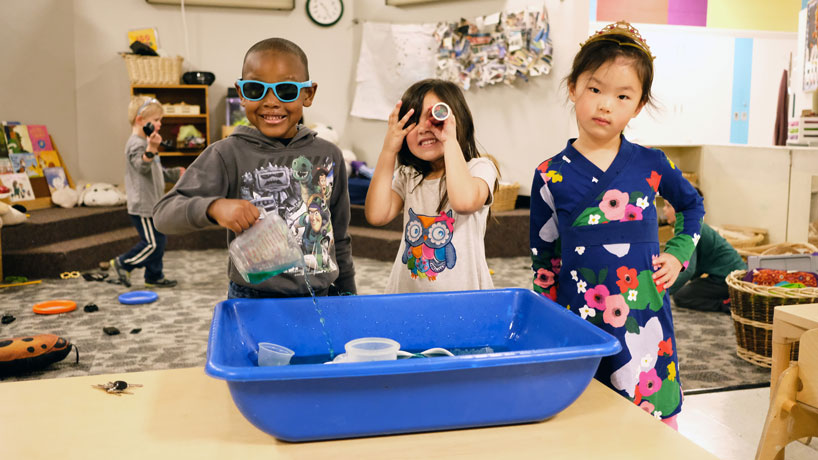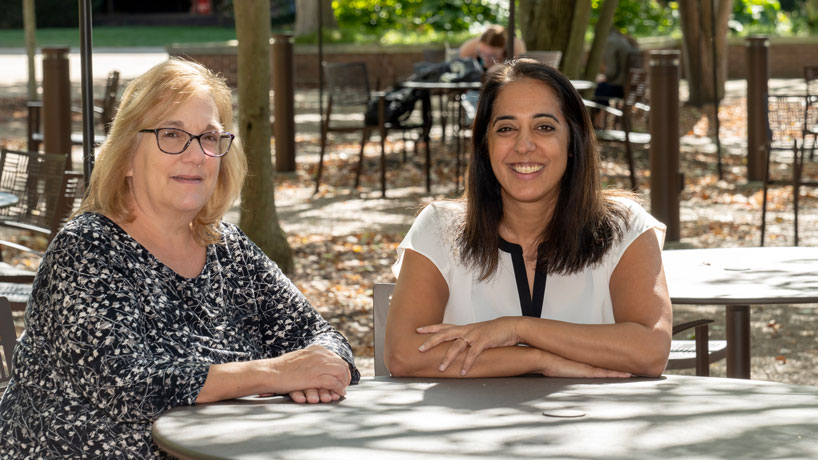
The U.S. Department of Education’s Child Care Access Means Parents in School program awarded UMSL a four-year, $1.8 million grant, which the university will use to support low-income student parents on campus and to expand their access to high-quality child care. (Photo by August Jennewein)
In recent years, student parents have become an increasingly represented cohort on the University of Missouri–St. Louis campus, and the university is deepening its commitment to them through a new grant from the U.S. Department of Education.
The Child Care Access Means Parents in School program awarded UMSL a $1.8 million grant, which it will use to support low-income, Pell Grant-eligible student parents on campus and to expand their access to high-quality child care. The grant was awarded this month and will run until 2027. Programming related to the grant will begin in the spring semester. The award was part of more than $13 million that went to 34 institutions across the country.
Robin Kimberlin, director in the Division of Student Affairs, and Lynn Navin, assistant teaching professor in the College of Education, collaborated on the grant proposal. The pair previously worked together to secure a $528,000 CCAMPIS grant in 2018. They also submitted a proposal to the program last summer after the previous grant ran its course. That proposal was rejected, but it opened the door for significantly more funding this year.
“Last summer we wrote it and did not get awarded, so we were pretty devastated,” Kimberlin said. “But I think things all happen for a reason because the opportunity this year was much larger – almost double.”
Navin said UMSL has been a recipient of the CCAMPIS grant before 2018 as well, in 1999 and 2005. In those previous iterations, the grants provided low-income student parents subsidies to enroll their children at the University Child Development Center, which has since closed.
Lynn Navin, assistant teaching professor in the College of Education, and Robin Kimberlin, director in the Division of Student Affairs, collaborated on the grant. The pair previously worked to secure a CCAMPIS grant in 2018. However, they said this grant proposal is more ambitious and holistic than previous years (Photo by Derik Holtmann)
The bulk of the funding from the latest grant will go toward child care subsidies for accredited, licensed centers near student parents’ homes or work places. Kimberlin noted that child care costs are often unmanageable even for two full-time working adults and those costs are especially burdensome to student parents trying to work toward their degrees.
“By providing child care – that’s the majority of our funding and focus of the grant – you can retain and graduate those individuals,” she said. “The shift in their life that can happen is profound.”
Kimberlin and Navin added that most of UMSL’s more than 1,000 student parents are women, which creates an additional equity issue.
“There’s tons of research that says access to affordable child care is so critical to women, especially low-income, minority women,” Navin said.
The grant expands how student parents can use child care subsidies compared to previous years. UMSL student parents will receive child care that includes time for class, time for study, work on group projects, and to participate in practicums, internships and work study. There will also be allowances for one major campus event each semester.
“We’re going to provide child care once a semester for high-impact events that would put student parents on par with their non-parent peers,” Kimberlin said. “In fall, that will be orientation. If you’re a parent and you can’t attend orientation because you don’t have child care, right off the bat, you could be behind your non-parenting peers, who go to orientation. Then in the spring, we believe we’re going to provide child care during the career fair.”
Child care subsidies are a key feature, but Kimberlin and Navin said this grant proposal is more ambitious and holistic than previous years. Funding will also go toward support services on campus for student parents.
“Some of the grant highlighted things that UMSL is already doing,” Kimberlin explained. “We already have a food pantry. We provide diapers in our food pantry, so we’ll be able to provide financial support for that as well as sourcing baby food and potentially formula.”
Other measures include an emergency fund, which will help student parents attain parental necessities they might not be able to afford such as a car seat or breast pump. The grant will also support a part-time position for a case manager who will help student parents navigate campus, provide information on community resources and student services and encourage them to speak with their advisors about their parenting responsibilities and time demands.
Kimberlin said Student Affairs will also work with UMSL’s Title IX and Equity Office on education outreach materials for faculty members so they better understand how to work with pregnant and parenting students and the legal protections those student have. Navin added that there’s a multi-pronged workforce development piece of this new project to help bolster the child care sector since the number of quality facilities is lacking in the region.
Overall, the goal is to give student parents the opportunity to have more time on campus, outside of their class hours, to engage in the UMSL experience.
“We’re really trying to make sure that student parents have the opportunity to have all the academic experiences that their non-parenting peers have – not just race to and from class in order to get back to your child care,” Kimberlin said.
Student parents who are eligible for support from the grant, identified by Student Financial Services, will receive information via email later this semster. Kimberlin and Navin will also work to provide information about the program to multiple offices on campus to assist with connecting students.
Navin said the availability of high-quality child care is still a major issue at the local level, particularly with the closure of the University Child Development Center, and nationally as well. However, the CCAMPIS grant is helping UMSL take steps toward a better future.
“It really is looking at the student and the student and the child in the context of a family,” Navin said. “What we can do for the family, whatever that family unit is, to help them be successful and get a degree and then move up in the social mobility index. I think that is important.”















